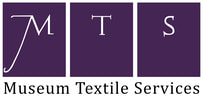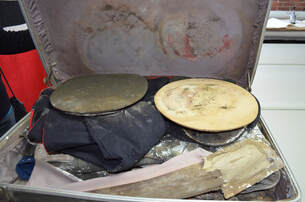|
Fumigation for museums, individuals, and insurance companies is now available at our Amesbury, MA, facility for clothing and textiles impacted by the following conditions:
|
The Museum Textile Services fumigation facility is located in Amesbury, Massachusetts, near the intersections of Interstate 95, Interstate 495, and Route 1. Drop-off and pick-up are by appointment only. All textiles must be dry to the touch at the time of delivery. We do not accept wet items. All items must arrive wrapped in plastic and be free of pest activity such as clothes moths. We do not fumigate textiles infested with insects. After fumigation, all items are returned in clean plastic, unless archival packing is requested.
Pricing Guide
The cost of fumigation is $450 per unit of space, equivalent to up to 15 gallons or 2.5 cubic feet. The entire chamber, measuring 500 cubic feet, can be rented for $3000. Examples of single units of space include:
|
|
Please contact us to help you determine how much space you need for your fumigation needs.
Additional services
Following fumigation, it is strongly advised to surface clean all items to remove inactivated mold and other particulate matter using a HEPA vacuum. Charges for surface cleaning range from $150 to $500 per textile. After surface cleaning, we can professionally pack your clothing and textiles in a new acid-free box or archival tube. Packing costs start at just $75.
Some items need additional conservation, such as washing, repairs, or display solutions. MTS can perform an assessment to determine your textile's needs and provide you with a conservation report for $300 per item. Framed textiles cannot be fumigated unless they are unframed by a conservator and have undergone a conservation assessment as part of the fumigation process.
Additional services
Following fumigation, it is strongly advised to surface clean all items to remove inactivated mold and other particulate matter using a HEPA vacuum. Charges for surface cleaning range from $150 to $500 per textile. After surface cleaning, we can professionally pack your clothing and textiles in a new acid-free box or archival tube. Packing costs start at just $75.
Some items need additional conservation, such as washing, repairs, or display solutions. MTS can perform an assessment to determine your textile's needs and provide you with a conservation report for $300 per item. Framed textiles cannot be fumigated unless they are unframed by a conservator and have undergone a conservation assessment as part of the fumigation process.

